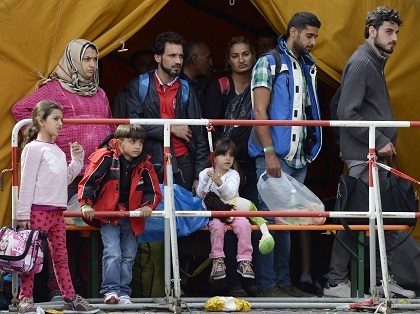Iraqi Asylum Seekers in Jordan Hesitant to Travel to Europe

Hanna Yussef dreams of following thousands of fellow Iraqi Christians to refuge in Europe, abandoning a precarious existence in Jordan, where he has lived since fleeing Islamist violence at home.
But he's staying put for now because he can't afford the money needed for the perilous crossing by sea and, equally as important, because he can't swim.
Like so many other Iraqi Christians, this 45-year-old father is a refugee after fleeing Iraq's northern city of Mosul, which was overrun by the Islamic State (IS) group in June of last year.
For more than a year and a half, Yussef, his wife and four children have been waiting for the United Nations High Commission for Refugees (UNHCR) to give them refugee status and a country in which to resettle.
"We've been abandoned, forgotten," he said. "It's really nerve-wracking."
But he says he is "not yet ready" to follow the Iraqis who have headed to Europe under their own steam, often paying smugglers to make the dangerous journey across the Mediterranean on flimsy, overcrowded boats.
"I can't swim," he says, adding that he is also afraid his two-year-old daughter and the rest of his family would not survive the crossing.
Besides, "I don't have the money for it," he says. "For all these reasons, I'm hesitant and I'd rather wait."
But while he waits, he's in a quandary. Jordanian law bans refugees from working in the country but he's received almost no financial aid.
"We don't know what will happen to us here. We don't have work, or a salary," Yussef says.
Since arriving in Jordan, he says he has only received the equivalent of $70 (60 euros) from UNHCR.
"We left behind all that we had built over dozens of years," says Yussef, who shares a flat in the Jordanian capital with two other Christian families.
About 50,000Iraqis are registered with the UNHCR in Jordan alongside 600,000 Syrian refugees, says Andrew Harper, UNHCR country representative in Jordan.
"If refugees do not find hope for a future or purpose in Jordan, they've got no alternative," Harper told Agence France Presse. "They either go back to... Iraq or they will look to go to Europe."
- The 'legal way' -
Of the Iraqis, about 11,000 are Christian, says Wael Suleiman, the representative in Jordan of Roman Catholic charity Caritas, which provides housing and aid to 2,000 of them.
"We want them to stay in the region," says Suleiman. "But for that, we need to support them. We try to rent houses for many of them... and we send their children to school."
"Right now we're fighting to get them work permits," he says.
Nassir, his wife Milad and their three children came to Jordan eight months ago from Qaraqosh, a town near Mosul that was Iraq's largest Christian town until IS seized it.
Today the Saint Joseph parish in central Amman provides them with accommodation and they receive food aid from Caritas.
Their claim for asylum in Australia has been rejected, but the Iraqi Christian insists on finding a "legal way" to obtain refugee status in Europe or elsewhere.
"I don't want anything illegal," he says.
Fellow Iraqi Christian Fadi Aziz, his wife and four girls have been waiting five years for a country in which to resettle.
The former state employee from Baghdad says he "would rather wait for the official procedure followed by UNHCR -- even if it's long and tiring."
The crossing to Europe is "expensive, long, difficult and can cost us and our children our lives," he said.
Another Iraqi, Sabah, wants his family to stay safe.
In Iraq, "we lived through attacks, kidnappings, assassinations and threats," he says. "We're tired, and we don't want to risk our lives again."



